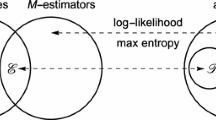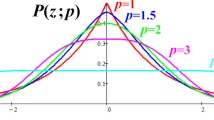Abstract
Typically T-optimality is used to discriminate among several models with Normal errors. In order to discriminate between two non-Normal models, a criterion based on the Kullback-Liebler distance has been proposed, the so called KL-criterion. In this paper, a generalization of the KL-criterion is proposed to deal with discrimination among several non-Normal models. An example where three logistic regression models are compared is provided.
Access this chapter
Tax calculation will be finalised at checkout
Purchases are for personal use only
Preview
Unable to display preview. Download preview PDF.
Similar content being viewed by others
References
Atkinson A (1972) Planning experiments to detect inadequate regression models. Biometrika 59:275–293
Atkinson AC, Cox D (1974) Planning experiments for discriminating between models. JR Statist Soc B 36:321–348
Atkinson AC, Fedorov V (1975a) The designs of experiments for discriminating between two rival models. Biometrika 62:57–70
Atkinson AC, Fedorov V (1975b) Optimal design: experiments for discriminating between several models. Biometrika 62:289–303
Burnham K, Anderson D (1998) Model selection and inference: a practical information-theoretic approach. Springer-Verlag, New York
Fedorov V (1972) Theory of optimal experiments. Academic Press, New York
Fedorov V, Hackl P (1997) Model-oriented design of experiments. Springer-Verlag, New York
Ponce de Leon A, Atkinson A (1992) The design of experiments to discriminate between two rival generalized linear models. In: Lecture Notes in Statistics-Advances in GLM and Statistical Modelling, Springer-Verlag, New York, pp 159–164
López-Fidalgo J, Tommasi C, Trandafir P (2005) Optimal designs for discriminating between heteroscedastic models. In: Proceedings of the 5th St.Petersburg Workshop on Simulation, NII Chemestry Saint Petersburg University Publishers, Saint Petersburg, pp 429–436
López-Fidalgo J, Tommasi C, Trandafir P (2007) An optimal experimental design criterion for discriminating between non-normal models. JRStatistSoc B 69(2):1–12
Uciński D, Bogacka B (2004) T-optimum designs for multiresponse heteroscedastic models. In: mODa 7-Advances in Model-Oriented Design and Analysis, Physica-Verlag, Heidelberg, New York, pp 191–199)
Wynn H (1970) The sequential generation of d-optimal experimental designs. Ann Math Statist 41:1655–1664
Author information
Authors and Affiliations
Editor information
Editors and Affiliations
Rights and permissions
Copyright information
© 2007 Physica-Verlag Heidelberg
About this paper
Cite this paper
Tommasi, C. (2007). Optimal Designs for Discriminating among Several Non-Normal Models. In: López-Fidalgo, J., Rodríguez-Díaz, J.M., Torsney, B. (eds) mODa 8 - Advances in Model-Oriented Design and Analysis. Contributions to Statistics. Physica-Verlag HD. https://doi.org/10.1007/978-3-7908-1952-6_27
Download citation
DOI: https://doi.org/10.1007/978-3-7908-1952-6_27
Publisher Name: Physica-Verlag HD
Print ISBN: 978-3-7908-1951-9
Online ISBN: 978-3-7908-1952-6
eBook Packages: Mathematics and StatisticsMathematics and Statistics (R0)




